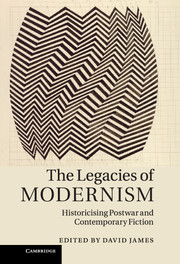Book contents
- Frontmatter
- Contents
- Notes on contributors
- Acknowledgements
- Introduction: mapping modernist continuities
- Part I Early legacies: inheriting modernism at mid century and beyond
- Part II Modernist aesthetics in transition: character, perception, innovation
- Part III Reassessing the ethics of modernist fiction
- Chapter 8 A complex legacy: modernity's uneasy discourse of ethics and responsibility
- Chapter 9 ‘A renewed sense of difficulty’: E. M. Forster, Iris Murdoch and Zadie Smith on ethics and form
- Chapter 10 ‘Myths of desire’: D. H. Lawrence, language and ethics in A. S. Byatt's fiction
- Part IV Modernism's global afterlives
- Epilogue Finding the dreadfully real
- Index
- References
Chapter 9 - ‘A renewed sense of difficulty’: E. M. Forster, Iris Murdoch and Zadie Smith on ethics and form
from Part III - Reassessing the ethics of modernist fiction
Published online by Cambridge University Press: 05 November 2011
- Frontmatter
- Contents
- Notes on contributors
- Acknowledgements
- Introduction: mapping modernist continuities
- Part I Early legacies: inheriting modernism at mid century and beyond
- Part II Modernist aesthetics in transition: character, perception, innovation
- Part III Reassessing the ethics of modernist fiction
- Chapter 8 A complex legacy: modernity's uneasy discourse of ethics and responsibility
- Chapter 9 ‘A renewed sense of difficulty’: E. M. Forster, Iris Murdoch and Zadie Smith on ethics and form
- Chapter 10 ‘Myths of desire’: D. H. Lawrence, language and ethics in A. S. Byatt's fiction
- Part IV Modernism's global afterlives
- Epilogue Finding the dreadfully real
- Index
- References
Summary
Henry James published his 1884 essay ‘The art of fiction’ as a critical response to a lecture on the same topic by the popular novelist Walter Besant. Among the issues he discussed, James questioned Besant's assertions about the novel genre's ethical function. Suggesting that Besant's position on the question of fiction's ‘moral purpose’ was unclear, he wondered if Besant was ‘recording a fact or laying down a principle’. The subject was ‘of immense importance’ and Besant was raising ‘considerations of the widest reach, not to be lightly disposed of’, but his treatment of them was vague. What, asked James, ‘is the meaning of your morality and your conscious moral purpose?’ Given that for James the novel resembled a kind of picture, it was hard for him to imagine in what sense this form of representation could be moral.
James's questions have an aestheticist ring to them. They recall Théophile Gautier's remarks in the preface to Mademoiselle de Maupin (1835) and look ahead to Oscar Wilde's claim that books are neither moral nor immoral, just well or badly written. In a now familiar move, James severs fiction from moral issues and argues that it is to be judged on artistic grounds. This separation of aesthetics from ethics has often been seen as a defining feature of modernism. It has been suggested that the ‘goal of the emancipation of art from the constraints and the burden of demonstrating a moral truth or of bearing a moral message is stated in the novels of early modernism’. This is true only up to a point. Many modernists rejected the idea that literature should be judged according to moral criteria, but this didn't mean that they were indifferent to moral questions. It would be more accurate to say that by freeing itself from moral prescriptiveness modernist literature sought to complicate our understanding of what Iris Murdoch describes as ‘a renewed sense of the difficulty and complexity of the moral life and the opacity of persons’. Modernism didn't demonstrate ‘moral truths’ but offered nuanced accounts of intractable problems, and its stylistic ‘difficulty’ was an integral aspect of its ethical anxiety. It's misleading to suggest that modernism in general sought to inhabit a privatised aestheticist realm.
- Type
- Chapter
- Information
- The Legacies of ModernismHistoricising Postwar and Contemporary Fiction, pp. 170 - 186Publisher: Cambridge University PressPrint publication year: 2011
References
- 3
- Cited by



